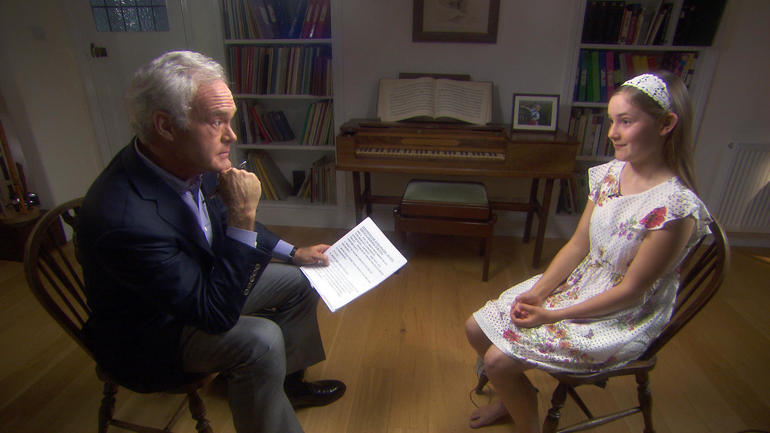Amaryllis
Amaryllis's JournalAnyone watching Rachel catch pained expression on woman in back of chairman during tax bill hearing?
RAchel showed protest in senate hearing on tax bill today and the woman sitting in back of the chairman had the most pained expression on her face; she was grimacing the whole time, like she couldn't believe the callousness of all the Rs voting for it in the face of the heart wrenching protests. At least that's how I read it. Anyone else?
Pocahontas Not a Racial Slur, Says Prominent White Expert (Borowitz)
“Pocahontas” Not a Racial Slur, Says Prominent White Expert
By Andy Borowitz
WASHINGTON (The Borowitz Report)—Donald J. Trump’s use of the name “Pocahontas” at a White House event honoring Navajo veterans was not a racial slur, a prominent white expert said on Monday.
“If some Native Americans were offended by the use of this term, I’m sorry that they’re so wrong,” the expert said. “As a white person, I think I’m in a better position to know about this stuff.”
She also defended the decision to honor the Navajo veterans near a portrait of Andrew Jackson, who is widely reviled by Native Americans. “Before we held the ceremony, we consulted with a number of other white experts, and we all agreed that Andrew Jackson was great,” she said.
At times, the white expert seemed exasperated at having to explain to Native Americans what was a racial slur and what was not. “Look, I can explain it to them, but it’s real time-consuming, and I have a lot of other stuff to do,” she said.
In closing, the Caucasian said that accusing Trump of intentionally offending the Navajos was absurd. “No one knows more about offending people than Donald Trump,” she said.
https://www.newyorker.com/humor/borowitz-report/pocahontas-not-a-racial-slur-says-prominent-white-expert?mbid=nl_Borowitz%20112817&CNDID=49083371&spMailingID=12454905&spUserID=MTgzMjI2MTM1NTc2S0&spJobID=1282579237&spReportId=MTI4MjU3OTIzNwS2
12 yr old girl played piano/violin by age 3, composed by age 4, wrote first opera age 10. Amazing!
Video at link. Transcript as well. It will make you happy!
The 12-year-old prodigy whose "first language" is Mozart
Alma Deutscher was playing piano and violin by the time she was 3 years old and wrote her first opera at 10. For her, making music seems as natural as breathing
We cannot explain what you are about to hear. Science doesn't know enough about the brain to make sense of Alma. Alma Deutscher is an accomplished British composer in the classical style. She is a virtuoso on the piano and the violin. And she is 12 years old. She's different from other prodigies we have known, because at the age of ten she wrote an opera, which demands comprehensive mastery; not just how to play the piano, but, what is the range of the oboe? What can a cellist play? We don't know how she understands it all. It seems that Alma was born that way.

snip
Scott Pelley: When did the composing begin?
Alma Deutscher: When I was four, I just had these melodies and ideas in my head, and I would play them down at the piano. And sometimes my parents would think that I was just remembering music that I'd already heard before. But I said, "No, no, these are my melodies, that I composed."
snip
Scott Pelley: Do you have any idea where this comes from?
Alma Deutscher: I don't really know, but it's really very normal to me to go around -- walk around and having melodies popping into my head. It's the most normal thing in the world. For me, it's strange to walk around and not to have melodies popping into my head. So if I was interviewing you, I would say, "Well, tell me Scott. How does it feel not having melodies popping into your head?

snip

snip

Scott Pelley: I usually don't ask people your age this question, but, what have you learned about life?
Alma Deutscher: Well, I know that that life is not always beautiful. That there's also ugliness in the world. That's why I, I've learned, that I want to write beautiful music because I want to make the world a better place.
https://www.cbsnews.com/news/the-12-year-old-prodigy-whose-first-language-is-mozart/
Millions of men suffer in silence after sexual abuse. How can we help them better? (Guardian)
Excellent article:
Millions of men suffer in silence after sexual abuse. How can we help them better?
David Lisak
The Guardian
Research indicates that one in six men experienced sexual abuse at some point during their childhood. Post-Weinstein, it’s time to cast off shame and secrecy
In the wake of the Harvey Weinstein allegations, more and more men in Hollywood are coming forward with their own stories of sexual harassment and sexual abuse within the entertainment industry. As they bravely share their experiences, a long taboo issue is being brought to the surface. To the tens of millions of men still suffering in silence, this can pave the way for healing.
As a forensic consultant, clinician, researcher, and survivor of sexual violence myself, I have for the past 30 years navigated the too-often secret terrain inhabited by men who have suffered sexual violence. I have listened to disclosures, I have catalogued symptoms, I have assessed emotional losses, and I have also witnessed the liberation that comes from casting off shame and secrecy.
In addition, when thinking about the statistic, we need to acknowledge the barriers that may prevent a man from disclosing his experiences; not only is there a lack of awareness about the issue and its prevalence (I often hear men say that they thought they were “the only one”), but societal expectations about what it means to “be a man” may cause a survivor to suppress his trauma.
From an early age, men receive the message that they should never be, or even appear, vulnerable or weak; the idea that men cannot be victims is central to gender socialization.
More:
https://www.theguardian.com/commentisfree/2017/nov/25/men-sexual-abuse-trauma-silence?utm_source=esp&utm_medium=Email&utm_campaign=GU+Today+USA+-+Collections+2017&utm_term=254008&subid=20993289&CMP=GT_US_collection
Trump-Russia Story Is Coming Together. Heres How to Make Sense of It. Bill Moyers.
http://billmoyers.com/story/trump-russia-story-coming-together-heres-make-sense/Editor’s Note: The news is coming so fast and furious, from so many sources and in so many fragments, that it takes more than a scorecard to keep up with the Trump-Russia connection. It takes a timeline — a “map,” if you will, of where events and names and dates and deeds converge into a story that makes sense of the incredible scandal of the 2016 election and now of the Trump Administration.
For years Steve Harper produced timelines for the cases he argued or defended in court as a successful litigator. Retired now from practicing law, Harper has turned his experience, talent, and curiosity to monitoring for BillMoyers.com the bizarre and entangled ties between Vladimir Putin and Donald Trump and the murky world of Russian oligarchs, state officials, hackers, spies, and Republican operatives. You can check out the over 700 entries right here. But for an overview — and some specifics — of recent developments, I called up Steve to give us a sense of the emerging story —Bill Moyers
Long but excellent article. This is the conclusion:
Moyers: One more: I assume most people believe Russia’s interference in the election last year is a bad thing, a serious offense, but is it possible that by treating Vladimir Putin and his cronies as an existential threat, we’re playing directly into Putin’s hands and making him appear a more significant figure in the world than he really is?
Harper: Well, he’s already achieved that, but the problem is, what’s the alternative? Back in January, John McCain and Lindsey Graham were on national television acknowledging the seriousness of the Russian interference. McCain called it the cyber equivalent of “an act of war.” And if you acknowledge and recognize the existential threat, do you sit back and let the let the next thing happen in 2018 that Vladimir Putin wants to do? Remember, we have elections coming up next year. The uniform view of US intelligence is unambiguous, and if you don’t view it as an existential threat then you’re willing, I think, to sacrifice democracy.
We keep hearing, “Yeah, but Trump was still legitimately elected, he won the election fair and square.” Now we’re realizing that that may not even be true. I don’t personally believe that to be true anymore. I rankle every time somebody says he won fair and square, because that’s become less obvious every day. So the last line of defense would be, “Well, even if he didn’t win fair and square, he’s our president, so we’ve got to sit back and let whatever Putin’s going to do to us continue to happen because we don’t want our response to raise his standing in the world.” Well, I would submit it raises Putin’s standing in the world even more to have an accomplice in the White House.
The OxyContin Clan: The $14 Billion Newcomer to Forbes List of Richest U.S. Families
This is from 2015, but I missed it. Very illuminating.
The richest newcomer to Forbes 2015 list of America’s Richest Families comes in at a stunning $14 billion. The Sackler family, which owns Stamford, Conn.-based Purdue Pharma, flew under the radar when Forbes launched its initial list of wealthiest families in July 2014, but this year they crack the top-20, edging out storied families like the Busches, Mellons and Rockefellers.
How did the Sacklers build the 16th-largest fortune in the country? The short answer: making the most popular and controversial opioid of the 21st century -- OxyContin.
Purdue, 100% owned by the Sacklers, has generated estimated sales of more than $35 billion since releasing its time-released, supposedly addiction-proof version of the painkiller oxycodone back in 1995. Its annual revenues are about $3 billion, still mostly from OxyContin. The Sacklers also own separate drug companies that sell to Asia, Latin America, Canada and Europe, together generating similar total sales as Purdue’s operation in the United States.
Forbes estimates that the combined value of the drug operations, as well as accumulated dividends over the years, puts the Sackler family’s net worth at a conservative $14 billion. The family also has an extensive philanthropic legacy, highlighted by large gifts to museums (including the Metropolitan Museum of Art , the Guggenheim, the Smithsonian, the Tate Gallery and the Louvre) and numerous universities, including Harvard, Oxford, Columbia,Tufts, NYU and the University of Edinburgh.
snip
But the drug wasn’t as abuse-resistant as it claimed. Someone looking for a fix could just crush the pills to break the time-release mechanism, then snort the powder for a heroin-like high. Addiction, overdoses and accidental deaths followed, and Purdue Pharma found itself facing charges that it had misbranded OxyContin as far less risky than it was. In 2007, Purdue paid $635 million in fines after pleading guilty to false marketing charges by the Department of Justice. (Sackler family members were never charged.)
https://www.forbes.com/sites/alexmorrell/2015/07/01/the-oxycontin-clan-the-14-billion-newcomer-to-forbes-2015-list-of-richest-u-s-families/#21f667a175e0
Next up on RAchel: DOJ has just subpeonad itself.
She said, "I know, I don't get it either," when she announced it, and then went to break and said it's up next.
Ursula Le Guin's Prescient Viral Video: "We Will Need Writers Who Can Remember Freedom"
In accepting the Medal for Distinguished Contribution to American Letters at this year’s (2014) National Book Awards, eminent sci-fi writer Ursula Le Guin made a knock-out speech about the power of capitalism, literature and imagination that, as she put it afterwards, “went sort-of viral on YouTube.”
This was remarkably prescient and significant.
"I think hard times are coming when we will be wanting the voices of writers who can see alternatives to how we live now and can see through our fear-stricken society and its obsessive technologies to other ways of being, and even imagine some real grounds for hope. We will need writers who can remember freedom. Poets, visionaries — the realists of a larger reality. …
Books, you know, they’re not just commodities. The profit motive often is in conflict with the aims of art. We live in capitalism. Its power seems inescapable. So did the divine right of kings. Any human power can be resisted and changed by human beings. Resistance and change often begin in art, and very often in our art — the art of words.
I have had a long career and a good one. In good company. Now here, at the end of it, I really don’t want to watch American literature get sold down the river. We who live by writing and publishing want — and should demand — our fair share of the proceeds. But the name of our beautiful reward is not profit. Its name is freedom."
Le Guin’s speech was fully transcribed by Parker Higgins, an activist at the Electronic Frontier Foundation in San Francisco. You can read the entire speech at Higgins’s blog.
In 2000, Bill Moyers interviewed Le Guin about the 1980 PBS adaptation of her 1971 book, The Lathe of Heaven, that became the most requested film ever in the PBS archives. The plot revolves around the main character’s dreams altering reality. Le Guin tells Bill she was very skeptical that it could be adapted for television. We’re working on adding the show to our archive, but in the meantime, here’s a version from YouTube.
http://billmoyers.com/2014/12/27/ursula-le-guin-will-need-writers-can-remember-freedom/
Does Congress Think Trump Can Be Trusted With Nuclear Weapons? (Mother Jones on Senate hearing)
Mother Jones on senate hearing yesterday:
As senators questioned three experts—retired Gen. C. Robert Kehler, a former commander of the US Strategic Command, Peter Feaver, a professor at Duke University, and Brian McKeon, a former acting undersecretary of policy at the Pentagon—the point was repeatedly made that Trump has the ultimate and sole authority to send nuclear weapons flying
snip
McKeon, though, had an answer. He told the committee that the president would certainly have recourse in the face of a defiant commander: He could order the defense secretary to instruct the commander to implement the order. If that didn’t work, the president could immediately fire the defense secretary and commander and get new ones. In other words, a commander refusing a nuclear order would likely only delay a president bent on deploying nuclear weapons. It would take essentially a military rebellion—commander after commander saying no to the president—to stop this nuclear war.
At one point, McKeon tried to present a calming sentiment: “It’s hard to imagine—and would be very unusual—for the president to make the decision to use nuclear weapons without consultations.” He insisted that if the president’s military and national security advisers had concerns about an order to use nuclear weapons, “we would be able to resolve those issues.” Feaver noted there would be a “large group” of military and legal advisers weighing in.
But Sen. Chris Murphy (D-Conn.) offered a sharp retort: “We are concerned that the president of the United States is so unstable and is so volatile…that he might order a nuclear weapon strike that is so wildly out of step with US national security interests.” Could calmer heads prevail? Not necessarily.
Watching the hearing, Joe Cirincione, a nuclear weapons expert and president of the Ploughshares Fund, tweeted, “Those defending the status quo, like Kehler, pretend that a ‘conference’ or ‘consultation’ must take place. This is not true. POTUS can make decision all by himself.” He added, “Kehler is trying desperately to avoid the obvious: If a crazy President orders a legal nuclear strike from one of the already vetted war plans, there is no one that can stop him.” (Cirincione also criticized the selection of the panel: “If you’re having a hearing on changing the president’s ability to launch nuclear war, you might want to have at least one witness who thinks we need to change. Just saying.”)
At the hearing, Sen. Edward Markey (D-Mass.) promoted legislation he has introduced that would prohibit a president from launching a nuclear first strike—that means an attack that is not in response to an imminent threat—without a declaration of war by Congress. Markey has argued that no president should be allowed to use nuclear weapons except in response to a nuclear attack. (Former Defense Secretary William Perry has endorsed Markey’s bill.) “I don’t think we should be trusting the generals to be a check on the president,” Markey said.
snip
http://www.motherjones.com/politics/2017/11/does-congress-think-trump-can-be-trusted-with-nuclear-weapons/#
Rachel just called the admin's behavior toward Russia "previously unthinkable submission."
Good phrase. The opposite of powerful. Like a dog lying down and wimpering in the face of an attack.
Profile Information
Member since: Mon Nov 29, 2004, 10:18 PMNumber of posts: 9,524